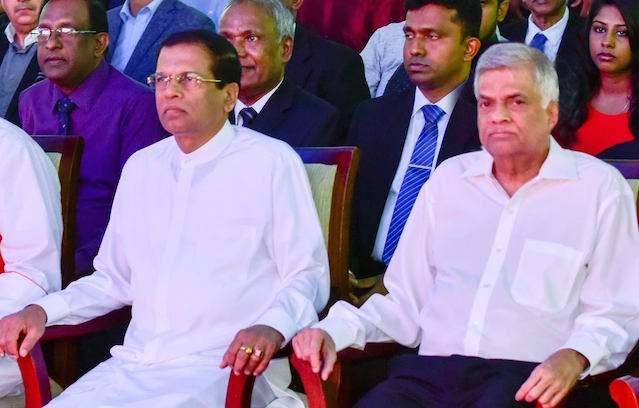Two Years Down The Line

By Shakthi De Silva –December 31, 2016
Two Years Down The Line: What Has This Government Achieved & What Should We Look Forward To In 2017?
As we know, the present government of Maithripala Sirisena came to power on a mandate of eradicating the country from nepotism and unimpeded corruption which was alleged to have run into the billions. It promised reconciliation and peace building to the international community and economic development along with sustainable debt management to the domestic public.
Ranked 83rd least corrupt country from a 168 (according to a transparency international report) the political leadership of Sri Lanka has revised and reevaluated investment project blueprints undertaken by the last regime. The country has been removed from the Committee to Protect Journalists Impunity Index, and has engaged in the grandiloquence of “transforming the island” to a financial and logistics hub in Asia. So is Sri Lanka on the path to rapid development and economic stability?
Well let’s not rush.
To start of, 2016 saw the Maithripala government co-sponsoring a resolution titled ‘Promoting reconciliation, accountability and human rights in Sri Lanka’ which decisively set it on the path to achieve lasting peace and reconciliation through a transitional justice process. The resolution promised to establish a hybrid court with a special counsel’s office, a truth and reconciliation commission, an Office for Missing Persons and an Office for Reparations among other pledges. Although critiqued by certain conservative sections as a step taken to put the country and its armed forces on the ‘electric chair’, the resolution has highlighted the government’s political will to get the reconciliation process underway. How fast this process goes however, can be debated. Concerns have also been voiced as to the process of sequencing and indigenizing reconciliation among the communities of the country. In an interview to the Huffington Post, Gehan Gunatilleke voiced these concerns:
“Local civil society actors have been pressing for sequencing that does not place accountability on the back burner. But this has not been the consistent view of international actors and advisors. I’m afraid the lack of deference to local demands has cost this process important momentum in terms of establishing an accountability mechanism.”

In his article to ‘Groundviews’ Professor Jayadeva Uyangoda similarly highlighted that: “As a concept, reconciliation has not been intellectually indigenized in Sri Lanka.” Thus indulging in rhetoric and promises that will never be fulfilled will not augur well with a rather politically charged community that has, since the defeat of the Rajapaksa’s, been more and more vocal in both traditional and modern media. March 2017 will also see Sri Lanka’s human rights situation coming up for discussion at the UNHRC where the progress of the 2015 resolution will be reviewed. So one can expect more pronouncements and rhetoric promising-action, come January 2017.
Sri Lanka also got underway with the task of introducing a new constitution. The public representations committee on constitutional reform concluded their painstaking task and submitted a rather hefty 219 page document to the prime minster and the parliament. The prime minister added a new twist to the ‘constitution making-tale’ by establishing a constitutional assembly from the existing parliament and at present, proceedings are underway to create a new constitutional which, if goes as planned, will see it go for a referendum in 2017. In this context one has to bear in mind that the year has not been very good in terms of predicting referendums. Referendums this year has seen the loss of establishment candidates in the U.S, BREXIT in the EU, opposition to the Colombia peace process with the FARC and the end of the tenure of Italian prime minister Matteo Renzi. Moreover survey conducted recently by the Centre for Policy Alternatives (CPA) revealed a rather shocking finding. A quarter of Sri Lankans are ‘unaware’ that there is even a Constitutional Reform process taking place, while “three-quarters of the population have not heard of the Constitutional Assembly.” So what will happen to the Sri Lankan constitution if it goes to a referendum next year? Only time will tell.
Although some may not know, the president went on to declare ‘2017’ a year to combat poverty in Sri Lanka; despite the lack of an institutionalized structure as yet. The ‘year of freedom from poverty’ declared by the president in his address to the 71st Session of the United Nations General Assembly will have to bring significant reductions in poverty levels which stands rather high in some parts of the country. This would require more than purely increasing taxes and would involve structural reform in the financial sector.
Noticeable achievements of the government this year include the passing of the 19th Constitutional Amendment and the Right to Information Act. Both have been hailed as opportune by many in civil society and has helped the government rank up its image abroad. This was compounded by the ratification of the International Convention for the Protection of All persons from Enforced Disappearance in May. Even the outgoing UN Secretary-General Ban Ki-moon in his visit to Sri Lanka in September this year remarked that steps such as singing the National Anthem in Sinhala and Tamil play a significant role in the path to peace building. Another high level visit to the island was by Zeid Ra’ad Al Hussein, United Nations High Commissioner for Human Rights who outlined his concern ‘that the Government has not moved fast enough with tangible measures to build confidence among victims and minority communities.’ While criticisms both constructive and otherwise continue in the domestic and international foray; as a Sri Lankan what can truly be valued is the very presence of criticism which had hitherto been silenced by political authorities of the previous regime.

